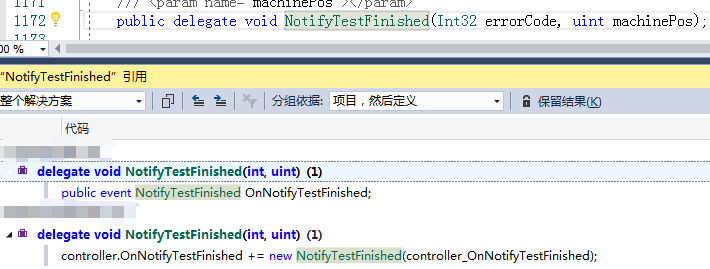每个编程者在项目中必定绕不开的话题:委托和事件。对于初学者来说,总会感觉有些难以理解,或者说无法自己随意运用。本文对委托、事件做一个详细的讲解,即是基础知识的自我温故,同时亦是记录。篇幅有些长,如果认真阅读,相信你会有所收获。
《Introducing Visual C# 2010》(Adam Freeman著,Apress出版)一书的第10章中有这样的介绍:
Delegates are special types thatencapsulate a method, similar to function pointers found in other programminglanguages. Delegates have a number of uses in C#, but you are most likely toencounter a special type of delegate—the event. Events make notifyinginterested parties simple and flexible, and I’ll explain the convention fortheir use later in the chapter.
委托是封装方法的特殊类型,它类似于其它编程语言中的函数指针。委托在C#中有大量运用,但你最可能遇到的是一种特殊的委托类型— 事件。事件使得对相关部件的通知变得简单而灵活,本章后面将解释其使用约定。
I’ll also explain the Func and Action typesthat let you use delegates in a more convenient form and that are usedextensively in some of the latest C# language features, such as parallelprogramming. We’ll finish up this chapter with a look at anonymous methods andlambda expressions, two C# features that let us implement delegates withouthaving to define methods in our classes.
我也会解释Func和Action类型,它们让你以更方便的形式使用委托,而且在一些最新的C#特性中也有广泛使用,如并行编程。本章最后考察匿名方法和lambda表达式,这是让我们不必在类中定义方法就可以使用委托的两个C#特性。
委托:
委托定义:将函数作为另一个函数的参数进行调用。另外的解释:当一个类或者是进程需要调用另外一个方法时,需要借助另外的类或者是进程进行调用,这种机制称为委托。网上有大牛说:委托可以理解为函数指针,不同的是委托是面向对象、类型安全的。
实现步骤:
1、声明一个委托类型:
public delegate int CalculateDelegate(int x, int y);
2、定义一个委托对象:
CalculateDelegate calculateDelegate = new CalculateDelegate(Add);
其中Add是委托封装的方法;
3、执行委托方法:
calculateDelegate(2, 3);
其中委托绑定的方法Add:
public static int Add(int x, int y)
{ return x + y;}
事件:
事件是一种特殊类型的委托
拿winform中button双击举例说明委托可能更加贴切:
声明一个委托,并声明一个事件:
public delegate void EventHandler(object sender, EventArgs e); public event EventHandler Click;
绑定一个事件:
this.button1.Click += new System.EventHandler(this.button1_Click);
this.button1_Click是一个方法:
private void button1_Click(object sender, EventArgs e){}
拿一个实际项目举例说明:
匿名方法:
匿名方法(Anonymous methods) 提供了一种传递代码块作为委托参数的技术。匿名方法是没有名称只有主体的方法。在匿名方法中您不需要指定返回类型,它是从方法主体内的 return 语句推断的。
在之前讲解委托时写到绑定方法:
CalculateDelegate calculateDelegate = new CalculateDelegate(Add); public static int Add(int x, int y)
{
return x + y;
}
如果使用匿名方法重写上面的代码:
CalculateDelegate calculateDelegate = delegate(int x, int y){return x + y;};
可见:匿名方法绑定委托直接省去了编写一个单独的方法,使得代码更为简洁。
项目中,使用委托时,很多时候编辑器会帮助我们把方法直接放入合适的委托对象中,但有时候编辑器帮助不了我们,比如:Control.Dispatcher.Invoke(delegate). 例如:
this.btnExit .Dispatcher .Invoke (new Action(() => {}));
Lambda表达式:
Lambda 表达式是一种匿名函数,简单地说,它是没有声明的方法,也即没有访问修饰符、返回值声明和名字;
C#的Lambda 表达式都使用 Lambda 运算符 =>,该运算符读为“goes to”。语法如下:
(object argOne, object argTwo) => {; /*Your statement goes here*/}
用Lambda表达式重写上面使用匿名方法编写的委托实例,在匿名方法的基础上,编写如下:
方式一:
CalculateDelegate calculateDelegate = (int x, int y) => { return x + y; };
方式二,更简单的表达:
CalculateDelegate calculateDelegate = (x, y) => { return x + y; };
方式三,再简单:
CalculateDelegate calculateDelegate = (x, y) => x + y;
从上面可以看出,Lambda仅仅是在匿名方法的基础上加上 => 符号,但是却让整个代码实现起来显得更为优雅。
泛型委托:
在.net平台下有Microsoft自带的泛型委托,如:Action,Action
Action
系统封装的Action委托,没有参数没有返回值。调用实例为:
public delegate void Action(); static void Main(string[] args)
{
Action action = new Action(Method);
action();
} private static void Method()
{
Console.WriteLine("i am is a action");
}
如果方法的表达很简单,可以使用Lambda表达式,代码如下:
Action action = () => { Console.WriteLine("i am is a action"); };
Action
系统封装的Action
public delegate void Action<in T1, in T2>(T1 arg1, T2 arg2); static void Main(string[] args)
{
Action<int,int> action = new Action<int,int>(Method);
action(2,3);
} private static void Method(int x,int y)
{
Console.WriteLine("i am is a action");
}
使用Lambda表达式编写Action
Action<int, int> action = (x, y) => { Console.WriteLine("i am is a action"); };
Fun
系统封装的Fun
public delegate TResult Fun<in T1, in T2, out TResult>(T1 arg1, T2 arg2); static void Main(string[] args)
{
Fun<int, int, bool> fun = new Fun<int, int, bool>(Method);
bool ret = fun(2,3);
} private static bool Method(int x,int y)
{
if (x + y == 5) return true;
else return false;
}
使用Lambda表达式编写Fun
Fun<int, int, bool> fun = (x, y) =>
{
if (x + y == 5) return true;
else return false;
};
Fun
Fun<bool> fun = () =>
{
int x = 4;
int y = 3;
if (x + y == 5) return true;
else return false;
}; //也可以如此编写Funfun = () => false;
多播委托:
最后说下多播委托,所谓多播委托,即 “多路广播委托”(MulticastDelegate)。从它的名字就可以看出,此种委托可以像广播一样将影响信息“传播”到四面八方。多播委托类拥有一个方法调用列表,调用委托时,它就会逐一调用该列表中的方法,从而实现多重影响。比较简单,暂不举例说明了。
本文暂且告一段落,如果想查看更多文章,请关注“小项目笔记”公众号;
如有疑问:可加入QQ群号:732982683
